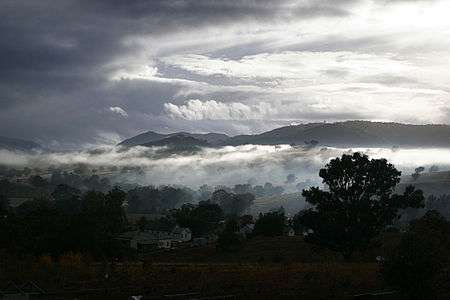Morning




Morning is the period of time between midnight and noon, especially from sunrise to noon.[1] There is no exact time for when morning begins and (equally true with evening and night), because they can vary according to one's lifestyle and the hours of daylight at each time of year.[2] However morning strictly ends at midday (12:00pm, also called 12:00 noon), which is when afternoon (ie after noon) starts. Morning can be defined as starting from after midnight (12 am) to noon (12 pm), or from sunrise (which varies throughout the year)[3] to noon, or from when one wakes up to noon. [4]
Morning precedes afternoon, evening, and night in the sequence of a day. Originally, the term referred to sunrise.[5]
Etymology

The Modern English words "morning" and "tomorrow" began in Middle English as morwening, developing into morwen, then morwe, and eventually morrow. English, unlike some other languages, has separate terms for "morning" and "tomorrow", despite their common root. Other languages, like German, may use a single word – Morgen – to signify both "morning" and "tomorrow".[6][7]
According to Max Weber (General Economic History pp23), the German word Morgen also takes on another meaning, specifically, the size of land strip "which an ox could plow in a day without giving out".[8] As such, a "good morning" could mean "a good day's plow".
Significance for humans
Some languages that use the time of day in greeting have a special greeting for morning, such as the English good morning. The appropriate time to use such greetings, such as whether it may be used between midnight and dawn, depends on the culture's or speaker's concept of morning. Many people greet someone with the shortened 'morning' rather that 'good morning'. It is usually always used a greeting, never a farewell, unlike 'good night' which is used as a farewell.
Morning typically encompasses the (mostly menial) prerequisites for full productivity and life in public, such as bathing, eating a meal such as breakfast, dressing, and so on. It may also include information activities, such as planning the day's schedule or reading a morning newspaper. The boundaries of such morning periods are by necessity idiosyncratic, but they are typically considered to have ended on reaching a state of full readiness for the day's productive activity. For some, the word morning may refer to the period immediately following waking up, irrespective of the current time of day. This modern sense of morning is due largely to the worldwide spread of electricity, and the concomitant independence from natural light sources.[9]
The morning period may be a period of enhanced or reduced energy and productivity. The ability of a person to wake up effectively in the morning may be influenced by a gene called "Period 3". This gene comes in two forms, a "long" and a "short" variant. It seems to affect the person's preference for mornings or evenings. People who carry the long variant were over-represented as morning people, while the ones carrying the short variant were evening preference people.[10]
References
- ↑ Oxford Living Dictionary Definition of "morning"
- ↑ Learner's Dictionary
- ↑ https://www.timeanddate.com/sun/uk/london
- ↑ Online Dictionary Definitions of "morning"
- ↑ Online Etymology Dictionary
- ↑ Origin of the phrase "Good Morning Archived 2012-02-03 at the Wayback Machine.
- ↑ Etymology of the word "morning
- ↑
Weber, Max (1961). General Economic History. New York: Collier Books. p. 23.
[...] the German plow [...] made [...] criss-cross plowing unnecessary, and for its use the division into long strips was most appropriate. The size of the separate strips was usually determined in this connection, by the amount which an ox could plow in a day without giving out - hence the Gernan names Morgen (English, 'morning' but equivalent to an acre) or Tagwerk (English, day's work).
- ↑ "Why some of us are early risers". BBC News. London. 2003-06-17. Retrieved 2008-01-30.
- ↑ Gene determines sleep patterns
External links


- Good Morning Images